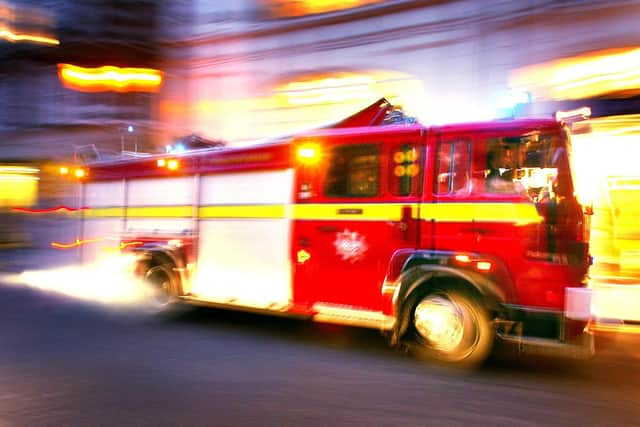Here's why Hertfordshire fire chiefs are planning NOT to attend automated fire alarms at shops
and live on Freeview channel 276
Fire chiefs in Hertfordshire have drawn-up plans NOT to attend automated fire alarms at a number of retail outlets across the county – unless the alarm is confirmed to be a fire.
The Fire and Rescue Service – which is operated by Hertfordshire County Council – agreed to pilot a similar approach to automated alarms at offices last year, in a bid to address the increasing number of ‘false alarms’ attended by crews.
Advertisement
Hide AdAdvertisement
Hide AdAs a result whenever an automated fire alarm was triggered at office buildings within the pilot the Service would require independent confirmation – from the premises or a passer-by – before responding.


According to data – included in papers for a meeting of the council’s public health and community safety cabinet panel – the approach has cut the number of false alarms attended at those offices in the pilot by two-thirds.
And now plans are being drawn up to extend the approach to a number of ‘low risk’ retail outlets too.
Those retail businesses that will be impacted by the changes have already been contacted.
Advertisement
Hide AdAdvertisement
Hide AdAnd the plans were highlighted at a meeting of the council’s public health and community safety cabinet panel on Tuesday (February 1).
At the meeting, assistant chief fire officer Simon Tuhill pointed to ‘the really good outcome’ of the first phase of the year-long trial, which had been focussed on a specific set of lower risk premises.
And he said that as a result of that the Service would now start to proceed to phase two of the trial, which would focus on lower risk retail premises.
But he also reassured councillors that during the first phase of the pilot there had not been an automated call that was not responded to, where a fire had later been discovered.
Advertisement
Hide AdAdvertisement
Hide Ad” . . . we are now going to start to proceed with phase two of that trial, which will identify similar low risk retail premises and start to roll of the same methodology,” he said.
“Just to give panel reassurance we do keep a close watch on the data and analyse what our crews are being mobilised to – and what they are not .
“And so in the period of this first part of the trial there haven’t been any incidents where we haven’t attended an automatic fire alarm – an unwanted fire signal – where there has been a fire
subsequently.
“So we will keep monitoring that – the trial is progressing really well. And we feel it is important to reduce the burden of those false alarms on the service.”
Advertisement
Hide AdAdvertisement
Hide AdProposing the first phase of the trial in 2020, fire officers had pointed to the increasing number of false alarms generated by automated fire alarms.
They had suggested that in the three previous years less than one per cent of call-outs to non-domestic properties – generated by automatic fire alarms – were actually fires.
And they said that attending so many false alarms had a major impact on the Service – diverting crews and making them unavailable to attend genuine calls.
Commenting further on the plans to extend the trial, following the meeting a spokesperson for Hertfordshire Fire and Rescue said: “Automatic fire alarm calls from shops and offices have historically made up a high proportion of the false alarms we are called to.
Advertisement
Hide AdAdvertisement
Hide Ad“Therefore, since June 2021, we have been trialling a policy where we do not send a fire engine to an automatic alarm, unless there is a confirmed fire.
“Prior to the trial each of the premises in scope were assessed and occupiers written to, to explain this proposal.
“Following a six-month trial, we are confident that we can safely extend this policy and reduce the amount of time our crews spend responding to false alarms.
“This in turn reduces risk of associated delays attending confirmed fires. We will continue to monitor the calls we get from automatic alarms and attend those outside the scope of this trial.”